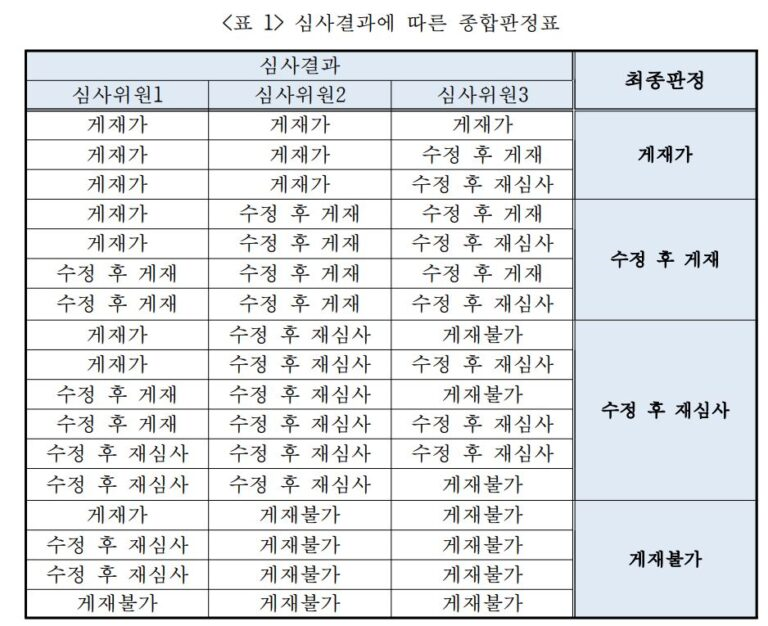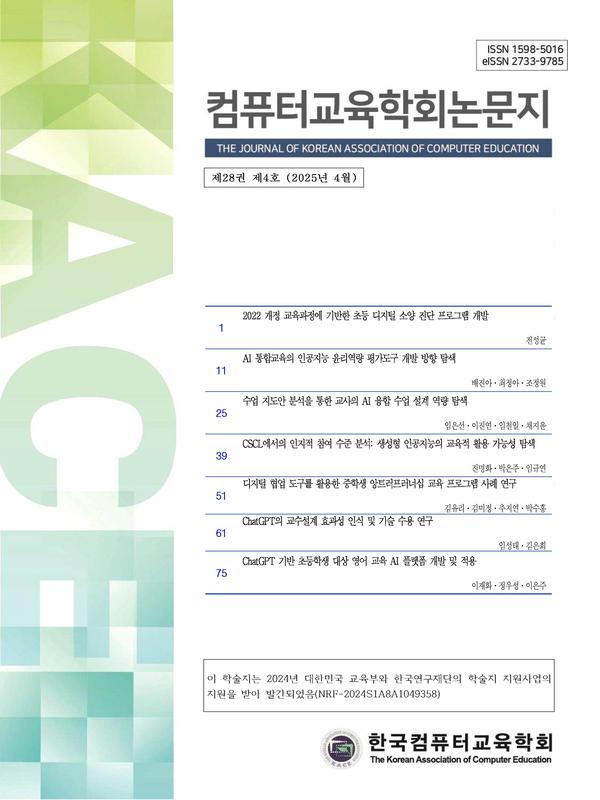| Browse Archive | About this Journal | For Contributors | e-Submission |
- KCI(Korea Citation Index)
- DOI(CrossRef)
- DOI(CrossCheck)
The Journal of Korean Association of Computer Education
ISSN : 1598-5016 (Print) / 2733-9785 (Online)
- KCI(Korea Citation Index)
- DOI(CrossRef)
- DOI(CrossCheck)
The Journal of Korean Association of Computer Education
ISSN : 1598-5016 (Print) / 2733-9785 (Online)
Sorry.
You are not permitted to access the full text of articles.
If you have any questions about permissions,
please contact the Society.
ņŻäņåĪĒĢ®ļŗłļŗż.
ĒÜīņøÉļŗśņØĆ ļģ╝ļ¼Ė ņØ┤ņÜ® ĻČīĒĢ£ņØ┤ ņŚåņŖĄļŗłļŗż.
ĻČīĒĢ£ Ļ┤ĆļĀ© ļ¼ĖņØśļŖö ĒĢÖĒÜīļĪ£ ļČĆĒāü ļō£ļ”Įļŗłļŗż.
Instruction for Reviewers
Regulations of Peer Review of Manuscript
Article 1 (Purpose)
The purpose of these regulations is to establish the rules for the rigorous and fair review and acceptance of papers submitted to the Journal of Korean Association of Computer Education (hereinafter referred to as the "Journal").
Article 2 (Submission)
The Editorial Committee of the Korean Association for Computer Education (hereinafter referred to as the "Editorial Committee") will receive papers after verifying the authors' information (affiliation/position). If a submitted paper has significant issues according to the Journal's submission guidelines (e.g., omission of author information, excessive or insufficient length, incorrect citation style, lack of an abstract) or if the paper violates research ethics (e.g., plagiarism or submitting a paper identical to one previously rejected), the Committee may request revisions or reject the submission. Additionally, if a paper does not conform to the submission format or does not align with the nature of the Journal, the Committee may request revisions or reject the submission.
Article 3 (Selection of Reviewers)
The Editorial Committee will appoint reviewers and manage the review process for submitted papers.
- 1. Three experts with sufficient professional knowledge in the relevant field will be appointed as reviewers.
- 2. Reviewers affiliated with the same institution as the paper's author(s) cannot be appointed.
- 3. If there is concern regarding a conflict of interest between a reviewer and the author, the reviewer must comply with the relevant provisions of Article 9 (Responsibilities of Reviewers) of the "Journal of Korean Association of Computer Education's Publication Ethics."
- 4. If a reviewer does not accept the review request within three days (excluding weekends and holidays) after being appointed, or if the review is not submitted within the regular (21 days) or urgent review period (10 days), the reviewer may be dismissed.
Article 4 (Ensuring Fairness in Review)
To ensure fairness and rigor in the review process, the following points shall be observed:
- 1. Information about the author(s) of the paper will not be disclosed to the editorial board members and reviewers, except for the Editor-in-Chief.
- 2. If the Editor-in-Chief submits a paper, all matters related to the selection of reviewers, etc., shall be delegated to a special editorial board member.
- 3. In the case of a paper submitted by an editorial board member, the board member shall be excluded from the review process.
Article 5 (Paper Review)
- 1. To ensure fairness in the review process, the identities of the reviewers and authors will not be disclosed to each other. The review and evaluation of papers are entirely at the discretion of the reviewers, and the Association holds no responsibility for the review outcomes.
- 2. The review process may involve up to three rounds. However, for special issues, the specific rules of the Editorial Committee apply.
- 3. Reviewers shall review the paper fairly based on the following criteria and provide a judgment of ŌĆ£Accept,ŌĆØ ŌĆ£Accept with Revisions,ŌĆØ ŌĆ£Revise and Resubmit,ŌĆØ or ŌĆ£Reject.ŌĆØ In the third round of review, the judgments shall be limited to ŌĆ£Accept,ŌĆØ ŌĆ£Accept with Revisions,ŌĆØ or ŌĆ£Reject.ŌĆØ
- ŌæĀ Originality of the research topic
- ŌæĪ Validity of the research methodology
- Ōæó Appropriateness of logical development
- ŌæŻ Thoroughness of literature and data analysis
- Ōæż Academic contribution
- Ōæź Compliance with the Journal's submission guidelines
- 4. The judgment of the paper shall, in principle, follow the comprehensive evaluation table in <Table 1>, and the final decision shall be made through a meeting of the Editorial Committee. (Table 1: Comprehensive Evaluation Table)
- o The table outlines various combinations of reviewer judgments and the corresponding overall decision (e.g., "Accept," "Revise and Resubmit," "Reject").
<Table 1> Judgement Table Examination Results Decision Reviewer1 Reviewer2 Reviewer3 Accept Accept Accept Accept Accept Accept Accept with Revision Accept Accept Revise and Resubmit Accept Accept with Revision Accept with Revision Accept with Revision Accept Accept with Revision Revise and Resubmit Accept with Revision Accept with Revision Accept with Revision Accept with Revision Accept with Revision Revise and Resubmit Accept Revise and Resubmit Reject Revise and Resubmit Accept Revise and Resubmit Revise and Resubmit Accept with Revision Revise and Resubmit Reject Accept with Revision Revise and Resubmit Revise and Resubmit Revise and Resubmit Revise and Resubmit Revise and Resubmit Revise and Resubmit Revise and Resubmit Reject Accept Reject Reject Reject Accept with Revision Reject Reject Revise and Resubmit Reject Reject Reject Reject Reject - 5. Cases not covered by the table shall be decided by the Editorial Committee meeting.
- 6. Even if the judgment is ŌĆ£Accept with RevisionsŌĆØ as per <Table 1>, if the author does not adequately reflect the reviewer's comments or if the likelihood of adequate revision is deemed low, the Editorial Committee may decide to reject the paper.
- 7. If the author does not submit the revised paper within one month without a valid reason, the paper will be considered "Rejected" after notifying the author. However, the submission period may be extended if the author provides a valid reason to the Editorial Committee within the revision period and receives approval.
Article 6 (Review Period)
The standard review period for each round is as follows. However, delays may occur due to reasons such as dismissal and reappointment of reviewers. For special issues, the specific rules of the Editorial Committee apply.
ŌĆó Regular Review
- o First review: within 21 days
- o Second and third reviews: within 14 days
- o Review summary: within 5 days
ŌĆó Urgent Review
- o First review: within 10 days
- o Second and third reviews: within 7 days
- o Review summary: within 3 days
ŌĆó Notification of Review Results
- o Notification to the author: within 3 days
ŌĆó Objection Request
- o AuthorŌĆÖs objection request: within 7 days
- o Editorial CommitteeŌĆÖs notification of results: within 14 days
Article 7 (Objection Request)
If the author disagrees with the review result, they may submit a written objection within seven days of receiving the review result. The objection to the review result is allowed only once, and the Editorial Committee must review and confirm the contents of the objection. The Editorial Committee must notify the author of the results of the review of the objection within 14 days.
Article 8 (Confidentiality)
All information related to the paper review process must not be disclosed to third parties. If any information about the author or reviewer is leaked, the issue may be referred to the Research Ethics Committee for disciplinary action.
Article 9 (Miscellaneous)
- 1. Any matters not specified in these regulations shall be decided by the Editorial Committee.
- 2. The detailed operational procedures for applying these regulations may be separately determined through meetings of the Editorial Committee as needed.
Supplementary Provisions
Article 1 (Effective Date)
These regulations shall come into effect on August 8, 2024.
ļģ╝ļ¼Ėņŗ¼ņé¼ ĻĘ£ņĀĢ
ņĀ£ ņĀĢ 1997. 10. 02.
Ļ░£ ņĀĢ 2007. 12. 01.
Ļ░£ ņĀĢ 2012. 01. 01.
Ļ░£ ņĀĢ 2013. 03. 01.
Ļ░£ ņĀĢ 2016. 04. 14.
ņĀäļ®┤Ļ░£ņĀĢ 2020. 12. 01.
ņĀ£1ņĪ░(ļ¬®ņĀü)
ļ│Ė ĻĘ£ņĀĢņØĆ ĒĢ£ĻĄŁņ╗┤Ēō©Ēä░ĻĄÉņ£ĪĒĢÖĒÜī(ņØ┤ĒĢś ĒĢÖĒÜīļØ╝ ĒĢ£ļŗż.) ļģ╝ļ¼Ėņ¦ĆņŚÉ Ēł¼Ļ│ĀļÉ£ ļģ╝ļ¼ĖņØś ņŚäņĀĢĒĢśĻ│Ā Ļ│ĄņĀĢĒĢ£ ņŗ¼ņé¼ ļ░Å ņ▒äĒāØ ņŚ¼ļČĆļź╝ ĻĘ£ņĀĢĒĢ©ņØä ļ¬®ņĀüņ£╝ļĪ£ ĒĢ£ļŗż.
ņĀ£2ņĪ░(ņĀæņłś)
ļ│Ė ĒĢÖĒÜī ļģ╝ļ¼Ėņ¦ĆĒÄĖņ¦æņ£äņøÉĒÜī(ņØ┤ĒĢś ĒÄĖņ¦æņ£äņøÉĒÜī)ļŖö ļģ╝ļ¼ĖņØś ņĀĆņ×É ņĀĢļ│┤(ņåīņåŹ/ņ¦üņ£ä)ļź╝ ĒÖĢņØĖĒĢ£ Ēøä ļģ╝ļ¼ĖņØä ņĀæņłśĒĢśĻ│Ā, ņĀüĒĢ®ņä▒ Ļ▓ĆĒåĀ ļŗ©Ļ│äņŚÉņä£ ņĀæņłśļÉ£ ļģ╝ļ¼ĖņØ┤ ĒĢÖņłĀņ¦Ć ĒÄĖņ¦æĻĘ£ņĀĢ ņāü ņżæļīĆĒĢ£ ĒĢśņ×É(ņĀĆņ×É ņĀĢļ│┤ ļłäļØĮ, ļČäļ¤ēņØś Ļ│╝ļīĆ ļ░Å Ļ│╝ņåī, ņŻ╝ņäØļ░®ņŗØ, ņ┤łļĪØņØś ļłäļØĮ ļō▒)Ļ░Ć ņ׳Ļ▒░ļéś ņŚ░ĻĄ¼ņ£żļ”¼ņŚÉ ļ▓Śņ¢┤ļé£ Ļ▓ĮņÜ░(Ēæ£ņĀł ļ░Å Ļ▓īņ×¼ļČłĻ░Ć ĒīÉņĀĢņØä ļ░øņØĆ ļģ╝ļ¼ĖĻ│╝ ļÅÖņØ╝ĒĢ£ ļģ╝ļ¼Ė ļō▒) ņłśņĀĢņØä ņÜöĻĄ¼ĒĢśĻ▒░ļéś Ļ▓īņ×¼ļČłĻ░Ć ņ▓śļ”¼ĒĢĀ ņłś ņ׳ļŗż. ļśÉĒĢ£ ļģ╝ļ¼ĖĒł¼Ļ│Ā ņ¢æņŗØņŚÉ ļČĆĒĢ®ĒĢśņ¦Ć ņĢŖĻ▒░ļéś, ļ│Ė ĒĢÖņłĀņ¦ĆņØś ņä▒Ļ▓®ņŚÉ ļ¦×ņ¦Ć ņĢŖļŖö ļģ╝ļ¼ĖņØĆ ņłśņĀĢņØä ņÜöĻĄ¼ĒĢśĻ▒░ļéś Ļ▓īņ×¼ļČłĻ░Ć ņ▓śļ”¼ĒĢĀ ņłś ņ׳ļŗż.
ņĀ£3ņĪ░(ņŗ¼ņé¼ņ£äņøÉ ņäĀņĀĢ)
ļ│Ė ĒĢÖĒÜī ĒÄĖņ¦æņ£äņøÉĒÜīļŖö ņĀæņłśļÉ£ ļģ╝ļ¼ĖņŚÉ ļīĆĒĢśņŚ¼ ņŗ¼ņé¼ņ£äņøÉņØä ņ£äņ┤ēĒĢśĻ│Ā ņŗ¼ņé¼ Ļ│╝ņĀĢņØä Ļ┤Ćļ”¼ĒĢ£ļŗż.
- 1. ĒĢ┤ļŗ╣ ļČäņĢ╝ņØś ņČ®ļČäĒĢ£ ņĀäļ¼ĖņĀü ņ¦ĆņŗØņØä Ļ░¢ņČś ņĀäļ¼ĖĻ░Ć 3ņØĖņØä ņŗ¼ņé¼ņ£äņøÉņ£╝ļĪ£ ņ£äņ┤ēĒĢ£ļŗż.
- 2. ļģ╝ļ¼ĖņØś ņĀĆņ×ÉņÖĆ ļÅÖņØ╝ ĻĖ░Ļ┤ĆņŚÉ ņåīņåŹļÉśņ¢┤ ņ׳ļŖö ņŗ¼ņé¼ņ£äņøÉņØĆ ņ£äņ┤ēĒĢĀ ņłś ņŚåļŗż.
- 3. ņäĀņĀĢļÉ£ ņŗ¼ņé¼ņ£äņøÉņØĆ ļģ╝ļ¼ĖņØś ņĀĆņ×ÉņÖĆņØś ņØ┤ĒĢ┤ņāüņČ®ņŚÉ Ļ┤ĆĒĢ£ ņÜ░ļĀżĻ░Ć ņ׳ļŖö Ļ▓ĮņÜ░ ļ│Ė ĒĢÖĒÜī ņČ£ĒīÉņ£żļ”¼ ĻĘ£ņĀĢ ņĀ£9ņĪ░(ļģ╝ļ¼Ė ņŗ¼ņé¼ņ£äņøÉņØś ĻĖ░ļ│Ė ņ▒ģļ¼┤)ņŚÉņä£ ĻĘ£ņĀĢĒĢśļŖö ļé┤ņÜ®ņØä ņżĆņłśĒĢśņŚ¼ņĢ╝ ĒĢ£ļŗż.
- 4. ņŗ¼ņé¼ņ£äņøÉ ņ£äņ┤ē Ēøä ņŗ¼ņé¼ ņØśļó░ 3ņØ╝ ņØ┤ļé┤(ņŻ╝ļ¦É ļ░Å Ļ│ĄĒ£┤ņØ╝ ņĀ£ņÖĖ)ņŚÉ ņŗ¼ņé¼ļź╝ ņłśļØĮĒĢśņ¦Ć ņĢŖĻ▒░ļéś, ņØ╝ļ░ś(21ņØ╝) ļ░Å ĻĖ┤ĻĖēņŗ¼ņé¼(10ņØ╝) ĻĖ░Ļ░ä ļé┤ ņŗ¼ņé¼ņØśĻ▓¼ņØä ņĀ£ņČ£ĒĢśņ¦Ć ņĢŖņØĆ Ļ▓ĮņÜ░ ņŗ¼ņé¼ņ£äņøÉņØä ĒĢ┤ņ┤ē ĒĢĀ ņłś ņ׳ļŗż.
ņĀ£4ņĪ░(ņŗ¼ņé¼ Ļ│ĄņĀĢņä▒ ĒÖĢļ│┤)
ļģ╝ļ¼Ėņŗ¼ņé¼ņØś Ļ│ĄņĀĢņä▒ ļ░Å ņŚäņĀĢņä▒ ĒÖĢļ│┤ļź╝ ņ£äĒĢśņŚ¼ ļŗżņØī ņé¼ĒĢŁņØä ņżĆņłśĒĢ£ļŗż.
- 1. ĒÄĖņ¦æņ£äņøÉņןņØä ņĀ£ņÖĖĒĢ£ ĒÄĖņ¦æņ£äņøÉ ļ░Å ņŗ¼ņé¼ņ£äņøÉņŚÉĻ▓īļŖö ļģ╝ļ¼ĖņØś ņĀĆņ×ÉņŚÉ Ļ┤ĆĒĢ£ ņé¼ĒĢŁņØä ļ╣äĻ│ĄĻ░£ļĪ£ ņ¦äĒ¢ēĒĢ£ļŗż.
- 2. ĒÄĖņ¦æņ£äņøÉņןņØ┤ Ēł¼Ļ│ĀĒĢ£ ļģ╝ļ¼ĖņØĆ ņŗ¼ņé¼ņ£äņøÉ ņäĀņĀĢ ļō▒ņØś ņĀ£ļ░śņé¼ĒĢŁņØä ĒŖ╣ņ×äĒÄĖņ¦æņ£äņøÉņŚÉĻ▓ī ņØ╝ņ×äĒĢ£ļŗż.
- 3. ĒÄĖņ¦æņ£äņøÉņØ┤ Ēł¼Ļ│ĀĒĢ£ ļģ╝ļ¼Ėņŗ¼ņé¼ņŚÉ ļīĆĒĢ┤ņä£ļŖö ĒĢ┤ļŗ╣ ĒÄĖņ¦æņ£äņøÉņØä ļ░░ņĀ£ĒĢśņŚ¼ ņ¦äĒ¢ēĒĢ£ļŗż.
ņĀ£5ņĪ░(ļģ╝ļ¼Ėņŗ¼ņé¼)
- 1. ļģ╝ļ¼Ėņŗ¼ņé¼ ņŗ£ Ļ│ĄņĀĢņä▒ ĒÖĢļ│┤ļź╝ ņ£äĒĢ┤ ņŗ¼ņé¼ņ£äņøÉĻ│╝ ņĀĆņ×ÉņŚÉ ļīĆĒĢ£ ņĀĢļ│┤ļŖö ņāüĒśĖ Ļ│ĄĻ░£ĒĢśņ¦Ć ņĢŖļŖöļŗż. ļģ╝ļ¼Ėņŗ¼ņé¼ ļ░Å ĒÅēĻ░ĆļŖö ņŗ¼ņé¼ņ£äņøÉņØś ņĀäņĀüņØĖ ĻČīĒĢ£ņØ┤ļ®░, ļ│Ė ĒĢÖĒÜīļŖö ņŗ¼ņé¼Ļ▓░Ļ│╝ņŚÉ ļīĆĒĢ£ ņ▒ģņ×äņØ┤ ņŚåļŗż.
- 2. ļģ╝ļ¼Ėņŗ¼ņé¼ļŖö ņĄ£ļīĆ 3ņ░©Ļ╣īņ¦Ć ņ¦äĒ¢ēĒĢ£ļŗż. ļŗ©, ĒŖ╣ņ¦æĒśĖņØś Ļ▓ĮņÜ░ 1ņ░© ņŗ¼ņé¼ļĪ£ ņĄ£ņóģ Ļ▓īņ×¼ ņŚ¼ļČĆļź╝ Ļ▓░ņĀĢĒĢĀ ņłś ņ׳ļŗż.
- 3. ņŗ¼ņé¼ņ£äņøÉņØĆ ļŗżņØīĻ│╝ Ļ░ÖņØĆ ļģ╝ļ¼Ėņŗ¼ņé¼ ĻĖ░ņżĆņŚÉ ļö░ļØ╝ Ļ│ĄņĀĢĒĢśĻ▓ī ņŗ¼ņé¼ĒĢśĻ│Ā ŌĆ£Ļ▓īņ×¼Ļ░ĆŌĆØ, ŌĆ£ņłśņĀĢ Ēøä Ļ▓īņ×¼ŌĆØ, ŌĆ£ņłśņĀĢ Ēøä ņ×¼ņŗ¼ņé¼ŌĆØ, ŌĆ£Ļ▓īņ×¼ļČłĻ░ĆŌĆØļĪ£ ĒīÉņĀĢņØä ļé┤ļ”░ļŗż. ļŗ©, 3ņ░© ņŗ¼ņé¼ņØś Ļ▓ĮņÜ░ņŚÉļŖö ŌĆ£Ļ▓īņ×¼Ļ░ĆŌĆØ, ŌĆ£ņłśņĀĢ Ēøä Ļ▓īņ×¼ŌĆØ, ŌĆ£Ļ▓īņ×¼ļČłĻ░ĆŌĆØļĪ£ ĒīÉņĀĢņØä ļé┤ļ”░ļŗż.
ļģ╝ļ¼Ėņŗ¼ņé¼ ĻĖ░ņżĆ
- ŌæĀ ņŚ░ĻĄ¼ ņŻ╝ņĀ£ņØś ļÅģņ░Įņä▒
- ŌæĪ ņŚ░ĻĄ¼ ļ░®ļ▓ĢņØś ĒāĆļŗ╣ņä▒
- Ōæó ļģ╝ļ”¼ ņĀäĻ░£ņØś ņĀüņĀłņä▒
- ŌæŻ ļ¼ĖĒŚī ļ░Å ņ×ÉļŻī ļČäņäØņØś ņČ®ņŗżņä▒
- Ōæż ĒĢÖļ¼ĖņĀü ĻĖ░ņŚ¼ļÅä
- Ōæź ĒĢÖņłĀņ¦Ć Ēł¼Ļ│Ā ĻĘ£ņĀĢņØś ņżĆņłś ņŚ¼ļČĆ
- 4. ņŗ¼ņé¼ņØśņøÉņØś ĻĄ¼ņ▓┤ņĀüņØĖ ņŗ¼ņé¼Ļ▓░Ļ│╝ņŚÉ ļö░ļźĖ ļģ╝ļ¼ĖņØś ņóģĒĢ®ĒīÉņĀĢņØĆ <Ēæ£ 1>ņØś ĒīÉņĀĢĻ▓░Ļ│╝Ēæ£ļź╝ ļö░ļźĖļŗż.

- 5. ņ£ä Ēæ£ņŚÉ ņĀ£ņŗ£ļÉśņ¦Ć ņĢŖņØĆ Ļ▓ĮņÜ░ņŚÉ ļīĆĒĢ┤ņä£ļŖö ĒÄĖņ¦æņ£äņøÉĒÜīņØś Ļ▓░ņĀĢņŚÉ ļö░ļźĖļŗż.
- 6. <Ēæ£ 1>ņŚÉ ņØśĒĢ┤ ŌĆ£ņłśņĀĢ Ēøä Ļ▓īņ×¼ŌĆØņØĖ Ļ▓ĮņÜ░ļØ╝ ĒĢśļŹöļØ╝ļÅä ņŗ¼ņé¼ņ£äņøÉņØś ņØśĻ▓¼ņØä ņČ®ņŗżĒ׳ ļ░śņśüĒĢśņ¦Ć ņĢŖņĢśĻ▒░ļéś, ņČ®ņŗżĒ׳ ļ░śņśüĒĢĀ Ļ░ĆļŖźņä▒ņØ┤ Ēؼļ░ĢĒĢśļŗżĻ│Ā ĒīÉļŗ©ļÉśļŖö Ļ▓ĮņÜ░ ĒÄĖņ¦æņ£äņøÉĒÜīņØś Ļ▓░ņĀĢņŚÉ ļö░ļØ╝ ĒĢ┤ļŗ╣ ļģ╝ļ¼ĖņØä Ļ▓īņ×¼ĒĢśņ¦Ć ņĢŖņØä ņłś ņ׳ļŗż.
- 7. ņĀĆņ×ÉĻ░Ć ļģ╝ļ¼ĖņØś ņłśņĀĢņØä ņÜöņ▓Łļ░øĻ│Ā ĒŖ╣ļ│äĒĢ£ ņé¼ņ£Ā ņŚåņØ┤ 1Ļ░£ņøö ņØ┤ļé┤ņŚÉ ņłśņĀĢ ļģ╝ļ¼ĖņØä ņĀ£ņČ£ĒĢśņ¦Ć ņĢŖļŖö Ļ▓ĮņÜ░ņŚÉ ņĀĆņ×É ĒåĄļ│┤ Ēøä ŌĆ£Ļ▓īņ×¼ļČłĻ░ĆŌĆØļĪ£ ņ▓śļ”¼ĒĢśļŖö Ļ▓āņØä ņøÉņ╣Öņ£╝ļĪ£ ĒĢ£ļŗż. ļŗ© ņłśņĀĢ ĻĖ░Ļ░ä ļÅÖņĢł ĒÄĖņ¦æņ£äņøÉĒÜīņŚÉ ņé¼ņ£Āļź╝ ņĀ£ņČ£ĒĢśņŚ¼ ņŖ╣ņØĖņØä ļ░øņØĆ Ļ▓ĮņÜ░ņŚÉļŖö ņĀ£ņČ£ ĻĖ░Ļ░äņØä ņŚ░ņןĒĢĀ ņłś ņ׳ļŗż.
ņĀ£6ņĪ░(ļģ╝ļ¼Ėņŗ¼ņé¼ ĻĖ░Ļ░ä)
ņ░©ņłśļ│ä ļģ╝ļ¼Ėņŗ¼ņé¼ ĻĖ░Ļ░äņØĆ ļŗżņØīņØä ņøÉņ╣Öņ£╝ļĪ£ ĒĢ£ļŗż. ļŗ©, ņŗ¼ņé¼ņ£äņøÉ ĒĢ┤ņ┤ēĻ│╝ ņ×¼ņ£äņ┤ē ļō▒ņØś ņé¼ņ£ĀļĪ£ ņŗ¼ņé¼ĻĖ░Ļ░äņØ┤ ņ¦ĆņŚ░ļÉĀ ņłś ņ׳ļŗż. ĒŖ╣ņ¦æĒśĖņØś Ļ▓ĮņÜ░ ņØ╝ļ░śļģ╝ļ¼ĖņØś 2ņ░© ņŗ¼ņé¼ ĻĖ░Ļ░äņŚÉ ņżĆĒĢśņŚ¼ ņĀüņÜ®ĒĢ£ļŗż.
ņØ╝ļ░śņŗ¼ņé¼
- ŌæĀ 1ņ░© ņŗ¼ņé¼: 21ņØ╝ ņØ┤ļé┤
- ŌæĪ 2, 3ņ░© ņŗ¼ņé¼: 14ņØ╝ ņØ┤ļé┤
- Ōæó ņŗ¼ņé¼ņ┤ØĒÅē: 5ņØ╝ ņØ┤ļé┤
ĻĖ┤ĻĖēņŗ¼ņé¼
- ŌæĀ 1ņ░© ņŗ¼ņé¼: 10ņØ╝ ņØ┤ļé┤
- ŌæĪ 2, 3ņ░© ņŗ¼ņé¼: 7ņØ╝ ņØ┤ļé┤
- Ōæó ņŗ¼ņé¼ņ┤ØĒÅē: 3ņØ╝ ņØ┤ļé┤
ņŗ¼ņé¼Ļ▓░Ļ│╝ ĒåĄļ│┤
- ŌæĀ ņĀĆņ×É ĒåĄļ│┤: 3ņØ╝ ņØ┤ļé┤
ņØ┤ņØś ņŗĀņ▓Ł
- ŌæĀ ņĀĆņ×É ņØ┤ņØś ņŗĀņ▓Ł: 7ņØ╝ ņØ┤ļé┤
- ŌæĪ ĒÄĖņ¦æņ£äņøÉĒÜī Ļ▓░Ļ│╝ ĒåĄļ│┤ : 14ņØ╝ ņØ┤ļé┤
ņĀ£7ņĪ░(ņØ┤ņØś ņŗĀņ▓Ł)
Ēł¼Ļ│Āņ×ÉĻ░Ć ņŗ¼ņé¼ Ļ▓░Ļ│╝ņŚÉ ņØ┤ņØśĻ░Ć ņ׳ņØä Ļ▓ĮņÜ░ņŚÉļŖö ņŗ¼ņé¼Ļ▓░Ļ│╝ļź╝ ĒåĄļ│┤ ļ░øņØĆ ļéĀļĪ£ļČĆĒä░ 7ņØ╝ ņØ┤ļé┤ņŚÉ ņä£ļ®┤ņ£╝ļĪ£ ņØ┤ņØśļź╝ ņĀ£ĻĖ░ĒĢĀ ņłś ņ׳ļŗż. ņŗ¼ņé¼Ļ▓░Ļ│╝ņŚÉ ļīĆĒĢ£ ņØ┤ņØś ņŗĀņ▓ŁņØĆ 1ĒÜīņŚÉ ĒĢ£ĒĢśņŚ¼ Ļ░ĆļŖźĒĢśļ®░, ĒÄĖņ¦æņ£äņøÉĒÜīņŚÉņä£ ņØ┤ņØśņŗĀņ▓Ł ļé┤ņÜ®ņØä ĒÖĢņØĖĒĢśĻ│Ā Ļ▓ĆĒåĀĒĢśņŚ¼ņĢ╝ ĒĢ£ļŗż. ĒÄĖņ¦æņ£äņøÉĒÜīļŖö ņØ┤ņØś ņŗĀņ▓ŁņŚÉ ļīĆĒĢ£ Ļ▓ĆĒåĀ Ļ▓░Ļ│╝ļź╝ 14ņØ╝ ņØ┤ļé┤ņŚÉ Ēł¼Ļ│Āņ×ÉņŚÉĻ▓ī ĒåĄļ│┤ĒĢśņŚ¼ņĢ╝ ĒĢ£ļŗż.
ņĀ£8ņĪ░(ļ│┤ņĢł)
ļģ╝ļ¼Ėņŗ¼ņé¼ņÖĆ Ļ┤ĆļĀ©ļÉ£ ņØ╝ņ▓┤ņØś ņĀĢļ│┤ļŖö ĒāĆņØĖņŚÉĻ▓ī Ļ│ĄĻ░£ĒĢĀ ņłś ņŚåņ£╝ļ®░, ņĀĆņ×É ļ░Å ņŗ¼ņé¼ņ£äņøÉņŚÉ ļīĆĒĢ£ ņĀĢļ│┤ļź╝ ļłäņäżĒĢ£ Ļ▓ĮņÜ░ ņŚ░ĻĄ¼ņ£żļ”¼ņ£äņøÉĒÜīņŚÉ ņĀ£ņåīĒĢśņŚ¼ ņĀ£ņ×¼ļź╝ Ļ░ĆĒĢĀ ņłś ņ׳ļŗż.
ņĀ£9ņĪ░(ĻĖ░ĒāĆ)
- 1. ļ│Ė ĻĘ£ņĀĢņŚÉ ļ¬ģņŗ£ĒĢśņ¦Ć ņĢŖņØĆ ņé¼ĒĢŁņØĆ ļģ╝ļ¼Ėņ¦ĆĒÄĖņ¦æņ£äņøÉĒÜīņØś Ļ▓░ņĀĢņŚÉ ļö░ļźĖļŗż.
- 2. ļ│Ė ĻĘ£ņĀĢ ņĀüņÜ®ņŚÉ ņ׳ņ¢┤ ņäĖļČĆ ņÜ┤ņśü ņé¼ĒĢŁņØĆ ĒĢäņÜöņŚÉ ļö░ļØ╝ ļģ╝ļ¼Ėņ¦ĆĒÄĖņ¦æņ£äņøÉĒÜīņØś ĒÜīņØśļź╝ ĒåĄĒĢ┤ ļö░ļĪ£ ņĀĢĒĢĀ ņłś ņ׳ļŗż.
ļČĆ ņ╣Ö
ņĀ£1ņĪ░(ņŗ£Ē¢ēņØ╝)
ļ│Ė ĻĘ£ņĀĢņØĆ Ļ│ĄĒżĒĢ£ ļéĀļČĆĒä░ ĻĘĖ ĒÜ©ļĀźņØ┤ ļ░£ņāØĒĢ£ļŗż.
ļ│Ė ĻĘ£ņĀĢņØĆ 2021ļģä 1ņøö 1ņØ╝ļČĆĒä░ ņŗ£Ē¢ēĒĢ£ļŗż.











